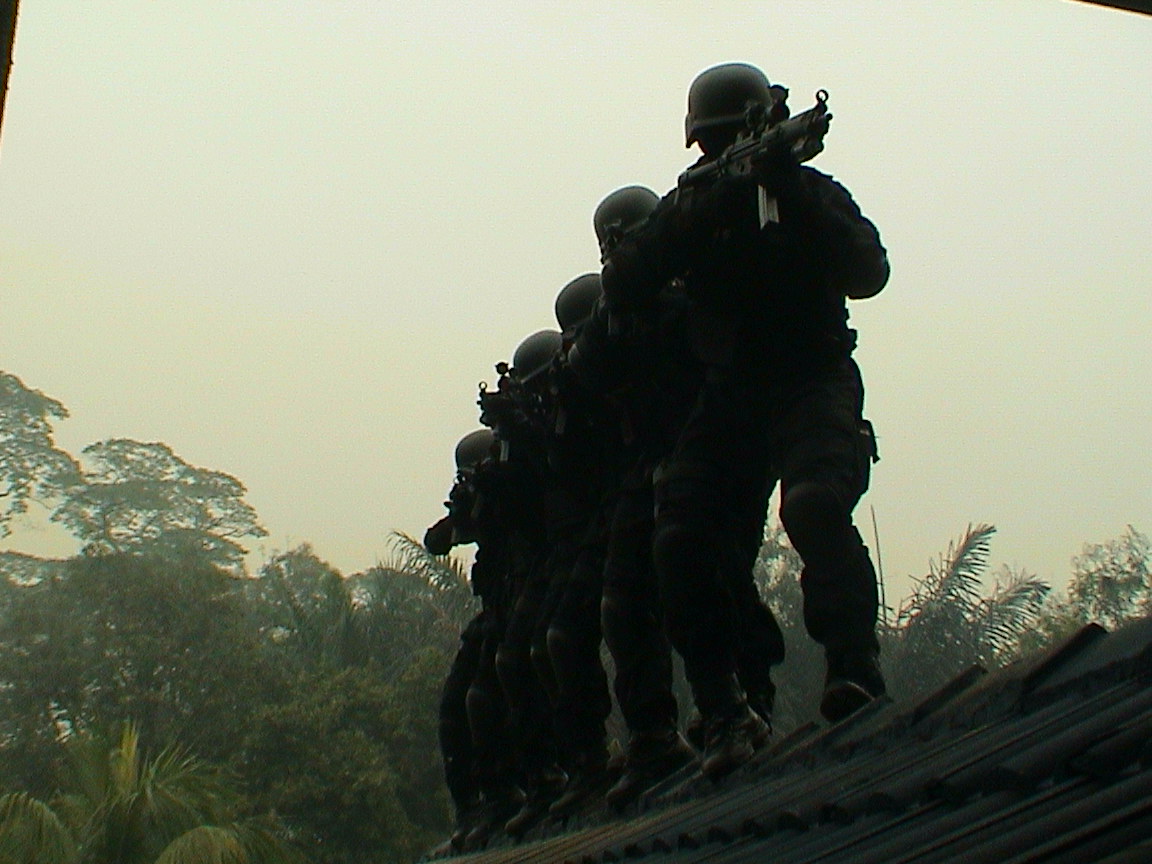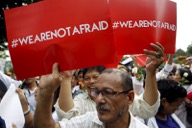By: Munira Mustaffa

While Indonesia successfully demonstrated remarkable resilience with her defiant cry of “Kami tidak takut” (“We are not intimidated”) on social media after the January 2016 attack,[1] there are some uncertainties that the same level of fortitude can be witnessed in Malaysia should a Daesh-inspired attack happen.[2] This raises some pressing debates about Malaysia’s existing counterterrorism policies and resilience strategies.
It is already known that Daesh has issued warnings that they had planned attacks on Westerners in Kuala Lumpur.[3] To date, there has been one attempt by local Daesh’s sympathisers which was successfully disrupted by members of the Royal Malaysia Police (RMP) in January.[4] Last month, in the latest government crackdown on local terror cells, over 100 individuals were detained for suspected involvement with the core Daesh militancy.[5] In previous arrests since 2013, many of them were reportedly first-time offenders who were radicalised online.[6]
However, capturing ringleaders or copycats do not guarantee our safety or guarantees against terrorist attacks. If anything, as demonstrated by open source media, the fact that Daesh as an organisation is weakening does not mean that it will not influence groups abroad.[7] Daesh supporters may be even more determined to intensify their overseas strategies.[8]
The probability that Kuala Lumpur could be the next target is rather sobering.[9] Filled with complex and multi-ethnic communities, along with abundant international visitors, countless international corporates and multi-national companies centred around an urban hub, one could argue that these factors make Kuala Lumpur a high-value target. Moreover, Putrajaya is currently being encumbered by grand corruption controversies involving the country’s sovereign wealth that could erode its “moderate Islam” image and status as the custodian of Malaysia Muslims’ religious interests.[10] The fact that Kuala Lumpur is highly populated by a large percentage of Muslims who Daesh sympathisers might consider as takfiri could be a potential concern.[11]
The Malaysia experience
Malaysia is no stranger to asymmetric warfare. Much of Malaysia’s experience and formation of current antiterrorism laws and legislation are legacies of the days of Malayan insurgencies. Post-insurgency, homegrown radical militant groups began to surface in the late 1960s, slowly evolving into today’s mujahideen extremists who are enjoying a revival and enthusiastically responding to the rallying call for global Muslim solidarity.[12] Although not all of them agree with Daesh’s brand of violence, one thing is clear: Daesh does make a convenient vehicle for them to realise their Daulah Islamiyah (Islamic State) ambitions in this region that imposes stricter Islamic interpretation of the law and way of life.[13]
Malaysia’s current counterterrorism (CT) measures
On the morning of November 26, 2014, Prime Minister Najib Razak tabled a white paper in Parliament entitled, “Towards countering threats posed by Islamic State Militant Group”.[14] Delivered entirely in Malay, Najib condemned the violence propagated by Daesh, encouraged support from the public to reject extremist ideas, and promised to increase efforts in reducing the threat of terrorism.[15]
It has been a little over a year since the submission of the white paper, which is available only in scanned copy online (and difficult to find).[16] Upon review, what was striking about the concluding remarks in the document was that the only solution proposed was to further stiffen existing anti-terror laws. These included the Security Offences (Special Measures Act) (SOSMA), Prevention of Crime Act (POCA) and the Penal Code. No other policy recommendations were provided to substantially elevate the current threat. This is worrying, considering the questionable way Malaysia’s anti-terror laws and legislation could be enforced and regulated.
For instance, in the past, opposition activists of the incumbent government have been arrested under the Internal Security Act (ISA) that was originally intended as a preventive measure against communist threats that no longer exist.[17] When the Prevention of Terrorism Act (POTA) 2015 was introduced as a response to the emerging Daesh threats, there were serious and justifiable concerns that it was just “a reincarnation of the ISA”.[18] Furthermore, the Communications and Multimedia Ministry recently submitted a proposal to the Attorney General for legal amendments to be made on the Communications and Multimedia Act 1998. If passed, this new law will require the registration of political blogs and online news portals with the government as an effort to counter “defamatory news” and “inflammatory opinions”.[19] Antithetical to the current administration’s previous pledge in 2012 to repeal the Sedition Act for more freedom of expression,[20] this proposal is a grim reminder how freedom of speech and Internet freedom in the country are being tightly scrutinised and regulated.[21]
Absence of robust policy framework and lack of public engagement
If we are to believe that the Najib administration is serious about mitigating terror threats at domestic level, then some further research, serious reassessments and critical revisions should be carried out to improve current policies. Information should be available in an efficiently accessible form that can be promptly found and used to maintain public interest, and keep them in the loop. As it stands, apart from the crackdowns, arrests and promises to tighten the law, it is difficult for the rakyat to gauge if other preventive measures have been implemented.[22] This lack of transparency and accountability in leadership creates unnecessary political vulnerabilities and heightens anxiety.
Dissidents would argue that the current administration benefits from the rakyat’s ignorance because the dynamics of the power play here allows more room for manipulation of the general public. In reality, the inadequate effort in engaging the public signifies how much the Malaysian government undervalues public contribution. Key security strategies should always include engaging the public as part of a concerted state effort to mitigate terrorism. Support from the public is crucial in assisting local law enforcement agencies, be it for crime prevention or counterterrorism. Everyone should be encouraged to feel like they are part of the nation-building narrative and meaningful governing process. The desired outcome could motivate people to step up to be part of the solution. Increasing community capabilities in acknowledging legitimate social problems, dispelling disruptive views and identifying suspicious behaviour would be productive, as opposed to citizens relying on false assumptions on what terrorism is or looks like.[23]
At present, there is no document or policy paper that is readily available online (or otherwise) that could comprehensively explain to the Malaysian public the nature of threat we are currently facing and how the government plans to react to terrorist threats or emergencies. Officially-released notices bear no semblance of even a formal presentation that could help distinguish them easily from rumours, which further exacerbate fear-mongering. One such instance is the Federal Territories Minister Tengku Adnan Tengku Mansor (aka Ku Nan) who decided to “notify” the public of the “list of targets” in possession of the captured Daesh members. It was not even within his jurisdiction to release such statement, of which even the PDRM themselves were mystified as to where and how did he receive his intelligence.[24] Regardless of the motive behind the public disclosure of the list of targets, Ku Nan’s action was not viewed favourably by the public at all – in fact he was slammed for being an alarmist.[25]
This is why many Malaysians feel excluded, mishandled and abandoned by top-level officials. Unless they are full of praise (such as the recent PR disaster of the #RespectMyPM Twitter campaign) or they carry certain myopic viewpoints that are supported from within the government, critical debates and discussions are actively discouraged.[26] For example, a popular Malaysian news portal, The Malaysian Insider, which has been blocked several times for allegedly publishing “inflammatory content” finally shuttered to a close after persistently reporting on the PM’s alleged misuse of sovereign funds.[27] More significantly, foreign journalists were recently deported for asking uncomfortable questions about the corruption allegations directed at the PM.[28] So when it was revealed last month that there was a terror plot to kidnap PM Najib Razak, of course it was greeted with a great collective disbelief.[29]
Counterproductive Outcomes
These latest episodes serve as a stark reminder that the Malaysian public’s value, trust and well-being are not a priority for the incumbent government. If anything, their reluctance to acknowledge their hand in the growing problem at the domestic level, and their stubbornness to adopt a more sensible policy-building approach is greatly impacting the situation. Considering that the ruling party has shown a lack of accountability and failed at fulfilling their political pledges on more than just one occasion, it is no wonder that the public is becoming exceedingly distrustful of it.
Meanwhile, despite assertions in news reports of the “success” of Malaysia’s de-radicalisation programmes which have been boasted as “the best in the world”, there is no official indication how these government programmes were planned or assessed for implementation.[30] Additionally, there is no clear definition for what “success” means in the programme’s introduction either.[31] Even more worrying, one of the agencies involved in the process is the controversial Islamic Development Department (JAKIM), well-known for their invasive and boundary-violating “moral-policing” activities which aimed to “preserve the chastity of Muslims” everywhere in the country.[32] In short, the question whether or not Malaysia is capable of coping with the growing terrorist threat remains unanswered.
Conclusion: rethinking security policies
It is true that Daesh’s brand of extremism has limited appeal in the Southeast Asia.[33] The Jakarta attack itself was poorly executed and, at best, amateurish. The probability of a Daesh attack to occur in Kuala Lumpur is still considerably low and and its threats should not be overestimated. However, the growing indoctrination, radicalisation and rising extremist views amongst Malay-Muslims continue to be worrying security conundrums and should be seen as a major counterterrorism challenge.[34]
There is also a disconcerting number of high-level people who are only too quick to shift the blame to external factors such as liberal values and pluralism, Jewish conspiracies, and Wahhabism/Salafism, of which local religious authorities are only too eager to distance themselves from.[35] Compound these all together, they build a grave picture that shows how far removed and complacent the Malaysian government can be from the reality of the current global threat.
While there is no doubt that the PDRM have been successful in their anti-terror sting operations, nevertheless tactical operations alone are not sufficient without robust counterterrorism policies and resilience strategies in place. More conscious efforts should also be made to improve cohesiveness amongst the diverse communities in Malaysia as part of a nation-wide strategy of building resilience against terrorism. The government would significantly benefit from public confidence in their capabilities. In turn, a mutually rewarding collaborative relationship could be forged.
Nonetheless, with the Prime Minister’s loss of legitimacy in the storm of his corruption scandal, fractured inter-community relations, and growing demands from the conservatives for a more Islamic and divisive Malaysia, one thing is certain, however: the country’s security landscape will become increasingly turbulent should things stay the way they are.
Munira Mustaffa is a strategic intelligence analyst and due diligence consultant for a private London-based firm. She earned her Master’s degree in Countering Organised Crime and Terrorism from the University College of London. She tweets at @FleetStGir1.
Notes:
[1][1] Rishi Iyengar, ‘Indonesians display defiance toward Jakarta attackers through rallies and social media’, Time, January 15, 2016, http://time.com/4182106/jakarta-rally-attacks-kami-tidak-takut/
[2] Zachary Abuza, ‘Terror attack could rip apart Malaysian society’, Southeast Asia Globe, March 7, 2016, http://sea-globe.com/terrorism-in-malaysia-zachary-abuza/
[3] Tom Batchelor, ‘ISIS targets Malaysia: terror group ‘very real’ threat after jihadis warn of reprisals’, Express, January 26, 2016, http://www.express.co.uk/news/world/638163/Islamic-State-Malaysia-terror-attacks-Jakarta-bombing
[4] Eileen Ng, ‘Malaysian police foil suicide blast hours before planned attack in Kuala Lumpur’, Stuff, January 17, 2016, http://www.stuff.co.nz/world/asia/75970763/Malaysian-police-foil-suicide-blast-hours-before-planned-attack-in-Kuala-Lumpur
[5] Victoria Ho, ‘Malaysia detains 13 suspected ISIS militants’, Mashable, March 24, 2016, http://mashable.com/2016/03/24/13-arrests-isis-malaysia/
[6] Elina Noor, ‘Identifying the root causes of terrorism’, New Straits Times, March 22, 2016, http://www.nst.com.my/news/2016/03/134311/identifying-root-causes-terrorism
[7] Henry Johnson, ‘Mapped: the Islamic State is losing its territory – and fast’, Foreign Policy, 16 March, 2016, http://foreignpolicy.com/2016/03/16/mapped-the-islamic-state-is-losing-its-territory-and-fast/
[8] Joshua Holland, ‘Here’s what a man who studied every suicide attack in the world says about ISIS’ motives’, The Nation, December 2, 2015, http://www.thenation.com/article/heres-what-a-man-who-studied-every-suicide-attack-in-the-world-says-about-isiss-motives/
[9] James Chin, ‘Malaysia: clear and present danger from the Islamic State’, Brookings, 16 December, 2015, http://www.brookings.edu/research/opinions/2015/12/16-malaysia-danger-from-islamic-state-chin
[10] Daniel Woker, ‘In Malaysia and Turkey, are we witnessing the end of moderate Islam?’, The Interpreter, 5 August, 2015, http://www.lowyinterpreter.org/post/2015/08/05/In-Malaysia-and-Turkey-the-end-of-moderate-Islam.aspx
[11] Hayat Alvi, 2014, ‘The diffusion of intra-Islamic violence and terrorism’, Middle East Review of International Affairs, Vol. 18, No. 2, p. 38-50.
[12] Mohd. Mizan Aslam, 2009, ‘The thirteen radical groups: Preliminary research in understanding the evolution of militancy in Malaysia’, Jati, 14, p.145-161
[13] Joseph Chinyong Liow, ‘Counterterrorism conundrum: rethinking security policy in Australia and Southeast Asia’, Foreign Affairs, 17 December, 2014, https://www.foreignaffairs.com/articles/southeast-asia/2014-12-17/counterterrorism-conundrum
[14] NajibRazak.com, ‘Ucapan pembentangan kertas putih ke arah menangani ancaman kumpulan Islamic State’, 26 November, 2014, https://najibrazak.com/bm/blog/ucapanpembentangan-kertas-putih-ke-arah-menangani-ancaman-kumpulan-islamic-state/
[15] Razak is the patronymic and refers to the Prime Minister’s father’s administration. In this essay, we will use Najib to denote this current administration.
[16] Malaysia, ‘Ke Arah Menanangani Ancaman Kumpulan Islamic State’, Dewan Rakyat/Dewan Negara, 2014, http://www.airforce.gov.my/images/PENERBITAN/kertasputihislamicstate.compressed.pdf
[17] Human Rights Watch, https://www.hrw.org/legacy/backgrounder/asia/malaysia-bck-0513.htm
[18] Munira Mustaffa, 2015, ‘Can POTA counter the ISIL threat in Malaysia?’, Strife, 9 May, 2015, https://strifeblog.org/2015/05/09/can-pota-counter-the-isil-threat-in-malaysia/
[19] Shazwan Mustafa Kamal, ‘Putrajaya weighing new leash for news portals, blogs’, The Malay Mail Online 16 March, 2016, http://www.themalaymailonline.com/malaysia/article/putrajaya-weighing-new-leash-for-news-portals-blogs
[20] Centre for Independent Journalism – CIJ Malaysia, ‘[Malaysia] Disappointments and promises in freedom of expression’, Southeast Asian Press Alliance, 6 May, 2015, https://www.seapa.org/disappointments-and-promises-in-freedom-of-expression/
[21] Mong Palatino, ‘Malaysia will likely force “political blogs” and news websites to register with the government,’ Global Voices, 23 April, 2016, https://globalvoices.org/2016/04/23/malaysia-will-likely-force-political-blogs-and-news-websites-to-register-with-the-government/
[22] Malay word for “ordinary citizens”.
[23] Munira Mustaffa, ‘Dismantling terrorism myths’, The Malay Mail Online, 22 February, 2016, http://www.themalaymailonline.com/what-you-think/article/dismantling-terrorism-myths-munira-mustaffa
[24] Eunice Au, ‘Top KL tourist areas cited as possible terror targets’, The Straits Times, 17 January, 2016, http://www.straitstimes.com/asia/se-asia/top-kl-tourist-areas-cited-as-possible-terror-targets
[25] Sebastian Loh, ‘Malaysian minister under fire for naming IS targets in Kuala Lumpur’, Asian Correspondent, 18 January, 2016, https://asiancorrespondent.com/2016/01/malaysian-minister-under-fire-after-naming-is-targets-in-kuala-lumpur/
[26] BBC, ‘#RespectMyPM: Online war breaks out in Malaysia’, March 7, 2016, http://www.bbc.co.uk/news/world-asia-35742118
[27] Jahabar Sadiq, ‘Eight proud years of being “The Malaysian Insider”’, The Bangkok Post, 22 March, 2016, http://www.bangkokpost.com/opinion/opinion/906004/eight-proud-years-of-being-the-malaysian-insider
[28] BBC, ‘Australian journalists leave Malaysia after avoiding charges’, March 15, 2016, http://www.bbc.co.uk/news/world-australia-35800172
[29] Amy Chew, ‘ISIS, Malaysia, and the risks of lost moral authority’, The Diplomat, March 22, 2016, http://thediplomat.com/2016/03/isis-malaysia-and-the-risks-of-lost-moral-authority/
[30] The Star, ‘Zahid Hamidi: Malaysia’s deradicalisation programme “best in the world”’, 20 February, 2016, http://www.thestar.com.my/news/nation/2016/02/20/zahid-hamidi-malaysia-deradicalisation-programme-best-in-the-world/
[31] New Straits Times Online, ‘Malaysia’s deradicalisation process a success’, 22 January, 2016, http://www.nst.com.my/news/2016/01/123407/malaysias-deradicalisation-process-success
[32] Kamles Kumar, ‘Moral policing driving youths away from Islam, Ku Li tells Jakim’, Malay Mail Online, 5 December, 2015, http://www.themalaymailonline.com/malaysia/article/moral-policing-driving-youths-away-from-islam-ku-li-tells-jakim
[33] Joseph Chinyong Liow, ‘ISIS reaches Indonesia’, Foreign Affairs, 8 February, 2016, https://www.foreignaffairs.com/articles/southeast-asia/2014-12-17/counterterrorism-conundrum
[34] Joseph Chinyong Liow, ‘Malaysia’s ISIS Conundrum’, Brookings, 21 April, 2015, http://www.brookings.edu/research/opinions/2015/04/21-malaysia-isis-conundrum-liow
[35] The Malay Mail Online, ‘Putrajaya in espionage, psychological warfare against “liberal” Islamic groups, minister says’, 18 March, 2016, http://www.themalaymailonline.com/malaysia/article/putrajaya-in-espionage-psychological-warfare-against-liberal-islamic-groups;
Robert Fulford, ‘Malaysia: a hotbed of anti-Semitism’, National Post, 2 January, 2016, http://news.nationalpost.com/full-comment/robert-fulford-malaysia-a-hotbed-of-anti-semitism;
The Malay Mail Online, ‘No place for Wahhabism in Malaysia, fatwa council says’, 1 March, 2016, http://www.themalaymailonline.com/malaysia/article/no-place-for-wahhabism-in-malaysia-fatwa-council-says




